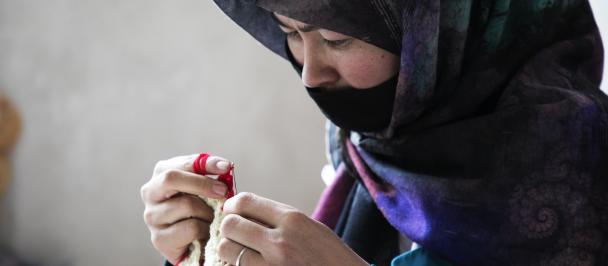By Agata Walczak, Global Project on Parliaments as Partners Supporting the Women, Peace and Security Agenda and Charles Chauvel, Global Lead and Asia-Pacific Focal Point, Inclusive Processes and Institutions
Women Peacebuilders in Parliaments: the Opportunities and Pitfalls of Online Engagement
November 19, 2020
With online abuse on the rise, sexist and misogynist hate speech is a particularly worrying trend that discourages women from being politically active.
Although women engage on social media more than men, they are also significantly more likely to experience online hate speech and harassment. Those in high-visibility and leadership roles are particularly targeted. As peacebuilding goes digital, women parliamentarians are defining their own rules of engagement to advocate for peace and inclusion.
Social media has been transforming politics and redefining civic engagement worldwide. Online platforms such as Twitter, Facebook and YouTube have emerged as vehicles for positive societal changes and, at the same time, a battleground where political power can be won or lost. With the growing use of artificial personas – trolls and bots – poised to take over the public debate, there have been serious concerns about the digital environment becoming a key vector for foreign actors’ interference. Deliberate disinformation efforts are now common around the globe, conducted in over 70 countries. In places with populist or authoritarian leanings, this is becoming the default modality for political discourse and campaigning.
The use of hate speech by and against political figures is increasingly proven to deepen existing divides and consequently create the conditions for societal violence. Research by Penn State University shows that inflammatory political language boosts domestic terrorism.
The growing misuse of internet and social media for spreading hate speech and disinformation has been blamed for deepening political polarization and contributing to distrust in political institutions. It threatens to discourage public engagement the vast majority of ordinary people who want to use the digital space in positive ways.
This trend has intensified during the Covid-19 pandemic which, in common with other emergency situations, is exacerbating gender inequalities, social tensions, and polarization across all development settings. In fragile contexts in particular, the pandemic has put a new strain on already tenuous social bonds.
With online abuse on the rise, sexist and misogynist hate speech is a particularly worrying trend that discourages women from being politically active, consequently undermining representative democracy. Combined with patriarchal stereotypes, gendered hate speech and harassment hinder women’s access to high-visibility and leadership roles and pose serious challenges to fulfilling their mandates. On a personal level, this abuse operates as a significant disincentive to women’s political participation, acting to demotivate and demoralize. It has a similar exclusionary effect on other population groups – including LGBTI people – when directed against them.
With the first-ever reversal of human development - arising out of the COVID crisis - disproportionately affecting women and girls, the leadership of women peacebuilders is even more relevant than usual. This leadership is critical if societies are to emerge from the crisis more resilient and sustainable. Women peacebuilders have quickly adapted to online advocacy and this channel can provide powerful potential for accelerating a more peaceful world for women and girls. At the same time, the misuse of digital tools for oppression, discrimination, and restriction of rights and liberties threaten to further marginalize women, erode their rights and restrict their voices. Women advocates in parliaments, all too often subject to gendered personal attacks and harassment, find it increasingly challenging to advocate and facilitate peace online.
Since 2018, UNDP has been working with parliaments and their members in the Asia Pacific region - including in Sri Lanka, Nepal, Myanmar - and beyond to play an active role in advancing their countries’ commitments on women, peace and security. Recognizing the tipping point for digital peacebuilding that the COVID-19 pandemic represents, the project has recently sought to capacitate its partner parliaments on effective and inclusive online engagement.
In November, a group of women peacebuilding champions from five partner parliaments took part in a masterclass on inclusive engagement and communication in the digital space. The masterclass was led by Ms. Janelle Saffin, a member of the New South Wales Legislative Assembly (Australia).
The free and honest discussion looked at the benefits of online platforms for women MPs, including their power to amplify the voices of women and girls at risk of being left out of political decisions. Apart from hate speech, digital literacy and technology gaps were identified as challenges which put parliamentarians and many constituents at a disadvantage in the online environment. Participant MPs and expert advisors looked at good practices from around the world such as Christchurch Call commitments and positive cross-party initiatives which, political will permitting, could be emulated in their own parliaments.
With support from the Government of Norway, the Global Project on Parliaments as Partners in Women, Peace and Security will continue to support parliaments and their peacebuilding champions in effective online engagement and communication for peace and inclusion.

 Locations
Locations


